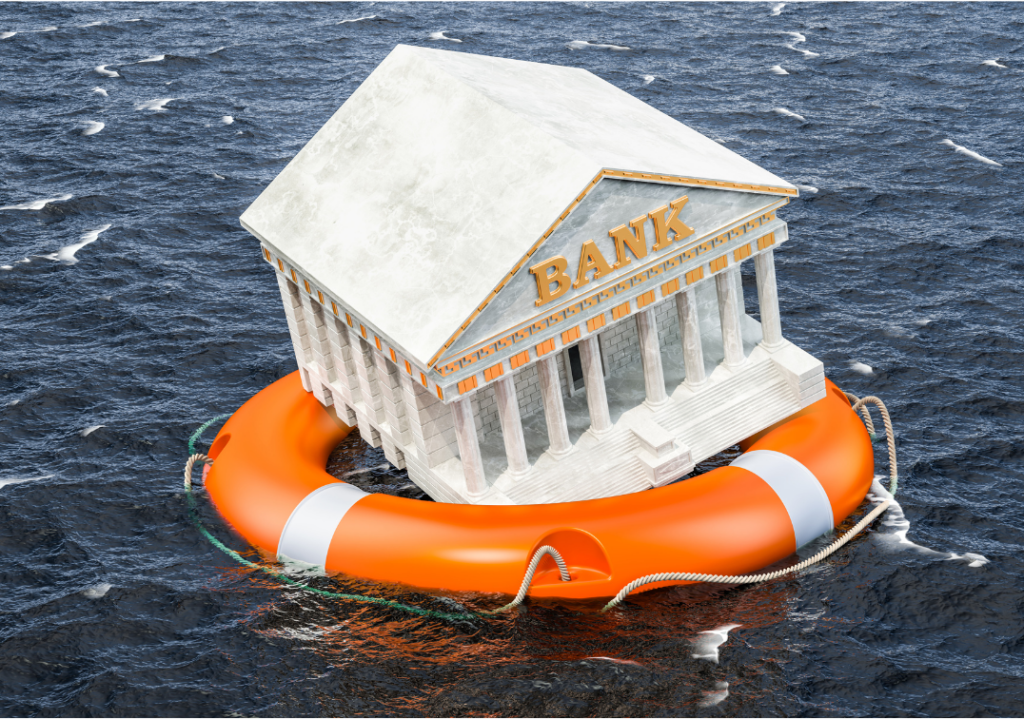Picture this: you wake up one morning, check your bank account, and notice something strange – your balance is a lot lower than it was the night before. You try to log into your bank’s website, but it’s down. You turn on the news, and there it is – your bank has failed. Customers of First Republic Bank, Silicon Valley Bank, and Signature Bank have lived that nightmare this year alone.
What Happens in a Bank Failure?

A bank failure occurs when a financial institution is unable to meet its obligations to its depositors and creditors, leading to its closure. When a bank fails, it can have severe consequences for depositors, who m
ay be at risk of losing their savings. It is essential to know what to do in such situations to minimize the impact on your finances.
So, What Do You Do Next?
While this scenario may seem like something out of a movie, it’s a real-life situation that can happen to anyone. Bank failures can be a stressful and overwhelming experience, but knowing what to do can help minimize the impact on your finances.
The first step is to stay informed. In today’s fast-paced world, news travels quickly, so check reputable news sources to find out what’s happening with your bank. If you cannot access your accounts online, try contacting the bank’s customer service line or visiting a branch.
The next step is to find out what’s happened to your accounts. In some cases, your accounts may be transferred to another financial institution, and you may be able to continue using them as normal. However, if your bank has been liquidated, you may need to file a claim to get your money back.
This can help to reduce the risk of financial crises spreading across borders and promote economic growth, thus securing your financial stability. In Europe, Deposit Guarantee Schemes (DGS) such as the Gibraltar plan offered additional layers of security thanks to their unique structures and policies.
As for Americans, the FDIC is there to help.
What is the FDIC?
In the financial universe, the Federal Deposit Insurance Corporation (FDIC) functions as a protective wall against financial instability. In the face of potential economic upheaval, the FDIC ensures the safety of the deposits we place in banks, providing a buffer against the stormy seas of the financial crisis. This indispensable role has made the FDIC a key player in maintaining financial stability in the United States since its inception in 1933.
How Does the FDIC Work?
For the layperson, the FDIC might seem like an abstract entity, a mere logo on a bank’s door or website. However, its impact on our financial lives is very real. The FDIC’s primary responsibility is to insure deposits in banks and thrift institutions for at least $250,000 per depositor, per insured bank, for each account ownership category.
This means if a bank fails, the FDIC is obligated to refund the deposits of the bank’s customers up to the insured limit. This insurance fosters trust between banks and their customers, as depositors know their savings won’t vanish overnight in the event of a bank failure.
Why is Trust in The FDIC Important?
Imagine a world without the FDIC. If rumors started circulating about a bank’s instability, customers would likely rush to withdraw their funds, creating a “run on the bank.” This sudden outflow of funds could push a struggling bank over the edge into bankruptcy, causing an adverse ripple effect throughout the entire financial system. But with the FDIC’s insurance, such a run on the bank is less likely because depositors are assured, they will recover their money even if the bank fails.
Moreover, the FDIC plays a critical role in bank supervision and regulation. It routinely audits financial institutions to ensure they follow laws and regulations designed to keep them healthy and stable. This oversight limits risky behavior that could endanger a bank’s solvency and, by extension, the broader financial system. If a bank does fail, the FDIC steps in to manage the orderly resolution and liquidation of assets, thereby limiting the potential fallout.
While the FDIC’s role as a deposit insurer and bank supervisor is critical, it also has a pivotal role in promoting economic inclusion. It encourages banks to provide services to unbanked and underbanked populations, promoting fair and equal access to banking services for all. This not only helps individuals to better manage their finances but also contributes to the overall health and stability of the financial system.
What Can’t the FDIC Do?
Now, let’s address a common misconception: the FDIC does not insure all types of investment. While it covers standard deposit accounts, such as checking, savings, money market deposit accounts, and certificates of deposit, it does not cover other financial products like mutual funds, annuities, life insurance policies, stocks, or bonds, even if these are purchased through a bank. It’s crucial to know this distinction to make informed financial decisions.
Conclusion
While a bank failure may seem like a nightmare scenario, knowing what to do can help you navigate the situation and protect your finances. Stay informed! Find out what’s happened to your accounts, and if necessary, file a claim with the FDIC.
Policymakers must ensure that the FDIC remains fair, adequately funded, and operate efficiently to provide the necessary protection to depositors and promote financial stability. Lastly, when in doubt, the most important thing is to stay calm and have a good eye on your finances, which is where Ripsaw can help.


